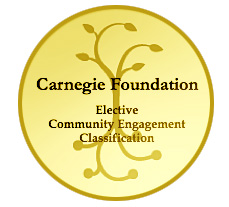

Build strong science, business, and analytical skills as you learn to conduct critical analysis of energy management and sustainability policy and its impact on the environment in this online bachelor of science degree program.
Apply multi-faceted knowledge (societal, economic, and technical) of both conventional and renewable energy use and its environmental implications.
Foster strong collaboration and facilitate stakeholder interactions on matters associated with energy, sustainability, and related policies.
Research and analyze current legislation and energy trends, then apply critical thinking to predict the impact of different policy scenarios.
Use ethics and leadership skills to navigate the complexities of energy and sustainability management.
Help balance global energy demand with resource availability.Conduct critical analyses of energy management efforts and recommend strategies to help organizations decrease usage, lower procurement costs, and reduce their carbon footprints.
The B.S. in Energy and Sustainability Policy (ESP) is a 120-credit online degree program that emphasizes sustainability principles, policy development, and energy production. Students in the B.S. program also choose supporting course work in focused areas closely related to the major.
View Course ListPrescribed course work includes such topics as:
You will also select additional courses in energy and science; analysis and technology; business and management; and ethics, leadership, and communications.
Introduction to speech communication: formal speaking, group discussion, analysis and evaluation of messages.
EBF 200 Introduction to Energy and Earth Sciences Economics Resource use decisions and their effect on local, national, and global development. Prerequisite ECON 102 and MATH 022 or equivalent C or better A student enrolled in this course must receive a grade of C or better. ECON 102 Introductory Microeconomic Analysis and Policy Methods of economic analysis and their use; price determination; theory of the firm; distribution. ECON 104 Introductory Macroeconomic Analysis and Policy National income measurement; aggregate economic models; money and income; policy problems. EGEE 102 Energy Conservation for Environmental ProtectionExposure to energy efficiency in day-to-day life to save money and energy, and thereby protect the environment.
C or better A student enrolled in this course must receive a grade of C or better. EGEE 120 Oil: International EvolutionSurvey of the commercial development of the world petroleum industry from various international, historical, business, and cultural perspectives.
EGEE 401 Energy in a Changing WorldEnergy is in transition, with increased international energy demand and increasing environmental pressures. Energy transitions, approaches, and outcomes are addressed.
Prerequisite EGEE 101 or EGEE 102 or CHEM 112 EMSC 240N Energy and Sustainability in Contemporary CultureCritical evaluation of selected media (e.g., books, film) in contemporary culture on topics related to energy and sustainability.
EMSC 302 Orientation to Energy and Sustainability PolicyOrientation to goals of the Energy and Sustainability Policy program and resources available to help students succeed.
C or better A student enrolled in this course must receive a grade of C or better. EME 444 Global Energy EnterpriseIndustry perspective on the resources, technologies, engineering approaches, and externalities involved in satisfying worldwide energy demand profitably and sustainably.
Prerequisite ECON 104 and EGEE 102 and EGEE 120 C or better A student enrolled in this course must receive a grade of C or better. EME 466 Energy and Sustainability in SocietyCapstone course in energy technology and policy options for reduced-carbon communities. Covering agent/stakeholder relations, sustainability, communication, and public engagement.
Prerequisite GEOG 30N , CAS 100 , GEOG 432 C or better A student enrolled in this course must receive a grade of C or better. ENGL 15 Rhetoric and CompositionAn intensive, rhetorically based experience in reading and writing that will prepare you both to understand the communications that surround you and to succeed in your own communication efforts.
Prerequisite ENGL 4 or satisfactory performance on the English placement examination The credits earned in this course may be applied toward the Writing/Speaking (GWS) requirement. ENGL 202D Effective Writing: Business Writing Writing reports and other common forms of business communication. Prerequisite (ENGL 15 or ENGL 30) and fourth-semester standing The credits earned in this course may be applied toward the Writing/Speaking (GWS) requirement. GEOG 30N Environment and Society in a Changing WorldIntroduction to the relationships between humans and the natural environment, in addition to the theories and methods that geographers employ in addressing them.
C or better A student enrolled in this course must receive a grade of C or better. GEOG 432 Energy PolicyAnalysis, formulation, implementation, and impacts of energy-related policies, regulations, and initiatives.
Prerequisite EBF 200 and EGEE 120 and PLSC 490 C or better A student enrolled in this course must receive a grade of C or better. GEOG 438W Human Dimensions of Global WarmingHuman dimensions of global environmental change: human causes; human adaptations; and policy implications of global warming.
Prerequisite ( EARTH 2 or GEOG 10 or METEO 3 ) and GEOG 30N C or better A student enrolled in this course must receive a grade of C or better. METEO 469 From Meteorology to Mitigation: Understanding Global WarmingExamination of global warming and climate change: the basic science, projects, impacts, and approaches to mitigation.
Prerequisite STAT 200 or MATH 110 or MATH 140 C or better A student enrolled in this course must receive a grade of C or better. PLSC 1 American Politics: Principles, Processes and PowersThis course examines the American democracy by looking at the dynamic interaction between the founding ideals of the United States government, the institutions established by the Constitution, and the ongoing contest for power within and through those institutions.
PLSC 490 Policy Making and EvaluationAdvanced analysis of public policy, emphasizing policy evaluation and the factors that determine policy success and failure.
Prerequisite (PLSC 1 and PLSC 2) or PUBPL 304W C or better A student enrolled in this course must receive a grade of C or better. STAT 200 Elementary StatisticsDescriptive Statistics, frequency distributions, probability and normal distributions, statistical inference, linear regression, and correlation.
Prerequisite Placement into MATH 21 or higher. C or better A student enrolled in this course must receive a grade of C or better.Supervised off-campus, nongroup instruction including field experiences, practica, or internships. Written and oral critique of activity required.

Penn State was selected by the Carnegie Foundation for its 2015 Community Engagement Classification, an honor resulting from our commitment to providing students with at least one outside-the-classroom engagement opportunity that impacts our community. For ESP students, foreign studies (EGEE 299) or domestic internship (EGEE 495) provide opportunity for learning outside of the classroom. You will work with faculty to design a meaningful and appropriate experience, considering your prior work and travel, interests, and professional aspirations.
Supporting courses should be selected in consultation with an adviser.
Some General Education requirements may be satisfied by courses required for the major. Students should work with an adviser to select courses.
These General Education Requirements are for students who started in summer 2023 or later. Students who started earlier can review the prior version of the general education requirements.
If you're ready to see when your courses will be offered, visit our public LionPATH course search (opens in new window) to start planning ahead.
Close Course List
The Bachelor of Science degree in Energy and Sustainability Policy (ESP) can prepare you for careers in the rapidly evolving energy and sustainability policy sector, especially where strong science, business, and analytical skills are required.
View Career InformationThe following roles are often held by people with this type of degree:
Estimates of employment growth and total employment are provided by the U.S. Bureau of Labor Statistics and are subject to change. While these occupations are often pursued by graduates with this degree, individual outcomes may vary depending on a variety of factors. Penn State World Campus cannot guarantee employment in a given occupation.

From the day you're accepted as a student, you can access resources and tools provided by Penn State World Campus Career Services to further your career. These resources are beneficial whether you're searching for a job or advancing in an established career.
You may work with a variety of organizations, advocacy groups, commercial firms, or regulatory bodies on projects related to:
Get the resources you need to make informed decisions about your education. Request information on this program and other programs of interest by completing this form.
Learn about this program's tuition, fees, scholarship opportunities, grants, payment options, and military benefits.
Tuition, Fees, and AidUndergraduate tuition is calculated based on the number of credits for which you register and the number of total credits you have accrued at or transferred to Penn State. Tuition is due shortly after each semester begins and rates are assessed every semester of enrollment.
| How many credits do you plan to take per semester? | If you have 59 or fewer credits | If you have 60 or more credits |
|---|---|---|
| 11 or fewer | $632 per credit | $678 per credit |
| 12–19 | $7,678 per semester | $8,288 per semester |
Undergraduate students taking more than 19 credits will be charged the flat tuition rate plus the regular per credit hour rate for each credit above 19.
Some students may qualify for financial aid. Take the time to research financial aid, scholarships, and payment options as you prepare to apply. Military service members, veterans, and their spouses or dependents should explore these potential military education benefits and financial aid opportunities, as well. To view the detailed list of cost of attendance elements, select “World Campus” as the location on the tuition site.
Military Grant-in-Aid is an undergraduate program that brings our tuition rate closer to the Department of Defense cap, making a Penn State World Campus–quality education more affordable to our military students and spouses. More details are on the Military Grants and Scholarships page.
Close Tuition, Fees, and AidThe ESP program not only instills a strong sustainability ethic, but it also integrates an international perspective so you can gain knowledge of international, social, cultural, and political dimensions of energy and sustainability considerations on a global scale.
The ESP program at Penn State is one of the few online programs in the country that focuses specifically on policy within energy and sustainability. Our program is all-inclusive, covering all forms of energy with policy serving as the program's nexus.
We offer a Bachelor of Science and a Bachelor of Arts in Energy and Sustainability Policy, both of which have the same General Education requirements and the same prescribed course work.
Learn Differences Between B.A. and B.S. programsFor those with prior learning experience, the applicability of earlier course work to degree requirements may also be a consideration.
Collapse Differences Between B.A. and B.S. programsWhether you are looking to finish your program as quickly as possible or balance your studies with your busy life, Penn State World Campus can help you achieve your education goals. Many students take one or two courses per semester.
How Long Will It Take?Our online courses typically follow a 12- to 15-week semester cycle, and there are three semesters per year (spring, summer, and fall). If you plan to take a heavy course load, you should expect your course work to be your primary focus and discuss your schedule with your academic adviser.
Timelines may vary for students transferring credits from another school or based on course availability.
Collapse How Long Will It TakeThis program's convenient online format gives you the flexibility you need to study around your busy schedule. You can skip the lengthy commute without sacrificing the quality of your education and prepare yourself for more rewarding career opportunities without leaving your home.


Penn State has a history of more than 100 years of distance education, and World Campus has been a leader in online learning for more than two decades. Our online learning environment offers the same quality education that our students experience on campus.

Are you a member of the military, a veteran, or a military spouse? Please visit our military website for additional information regarding financial aid, transfer credits, and application instructions.

Apply by October 31 to start January 13
Application InstructionsComplete your application and submit all required materials by the appropriate deadline. Your deadline will depend on the semester you plan to start your courses.
High school transcripts or GED transcript — First-year applicants are required to submit Self-Reported Academic Records (SRAR). Official high school transcripts will only be required at the time a student accepts an offer of admission to Penn State. Official college or university transcripts, if you attended another institution, and/or official military transcripts (if applicable). — All college or university transcripts are required regardless of the length of time that has passed, the grades earned, or the accreditation of the institutions attended. Acceptance of transfer credit toward your degree is subject to final approval by the academic department. For detailed information, see the Transfer Students page. Transcripts not in English must be accompanied by a certified translation. Please send your transcripts by mail or electronically through Parchment, eScrip-Safe, or the National Student Clearinghouse directly to Penn State from the college/university where course work was attempted. Submit official documents by mail to: Undergraduate Admissions Office
The Pennsylvania State University
201 Shields Building
University Park, PA 16802 English Proficiency — The language of instruction at Penn State is English. With some exceptions, international applicants must take and submit scores for the Test of English as a Foreign Language (TOEFL) or International English Language Testing System (IELTS). Minimum test scores and exceptions are found in the English Language Proficiency section on the Undergraduate Admissions International Requirements page. Visit the TOEFL website for testing information. Penn State's institutional code is 2660.
To begin the online application, you will need a Penn State account. Create a New Penn State Account If you have any problems during this process, contact an admissions counselor at [email protected] . Please note: Former Penn State students may not need to complete the admissions application or create a new Penn State account. Please visit our Returning Students page for instructions.
Review your information, digitally sign your application, and provide payment for the application fee ($65 domestic or $75 international).
All official documents should be sent to:
Undergraduate Admissions Office
The Pennsylvania State University
201 Shields Building
University Park, PA 16802
You can also have your transcripts sent electronically through Parchment, eScript-Safe, or the National Clearinghouse directly to Penn State from the college/university where course work was attempted.
After receiving your application, application fee, and all required materials, your application will be evaluated for admission. You can check your application status online. This will provide the most up‐to‐date information about the status of your application and is updated once daily, before 8:00 a.m. (ET). Once a decision has been made regarding your application, it will be available to you through the MyPennState portal.
For information on when you can expect an admissions decision, visit the Dates and Deadlines page of the Undergraduate Admissions website. Make sure you click the "+" sign to see these dates for World Campus Applicants (First-Year and Transfer).